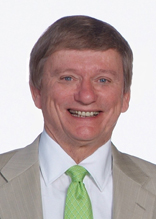By Janet Elliott
Staff Writer for The Texas Lawbook
HOUSTON – Anyone who has ever watched Rusty Hardin question a hostile witness or deliver a spellbinding closing argument knows there is something unique about his ability to captivate a room.
It was no different Friday when the former prosecutor and high-profile defense attorney spoke to several hundred attendees at the State Bar of Texas Annual Meeting.

“Make the courtroom your living room,” he said. “A trial lawyer needs to be the most comfortable person in the courtroom.”
That can mean smiling at jurors to make them relax, standing out from the other navy-blue suited attorneys with lighter-colored attire and risking a few open-ended questions.
Often described by in media stories as a “folksy” lawyer, the North Carolina native isn’t offended. “‘Folksy’ translated is ‘friendly’ because you’re from the south,” he said.
His open demeanor and attempts to deliver details of his small-town upbringing and family life to the jury has occasionally gotten him into trouble with the judge presiding over the Clemens trial in Washington D.C. Clemens is charged with lying to Congress about not using steroids.
He said a maître’d at a tony Washington restaurant recognized him from his seersucker suit, which had been noted in the Style Section of the Washington Post.
The jury has heard final arguments and will resume deliberations next week. Hardin said he expects a verdict mid-week. He cannot discuss the case because of a gag order.
The Clemens trial is the latest big case for the lawyer who learned his courtroom tactics trying misdemeanors in the mid-1970s for the Harris County District Attorney’s Office. He did not become a lawyer until he was 34.
In 1996, he established Rusty Hardin & Associates. His practice has been a mix of 85 percent civil trial work and 14 percent criminal. Clients have been as varied as Arthur Andersen in both its civil and criminal cases; ExxonMobil; Rice University; the Houston Texans; various trusts and a corporation established by J. Howard Marshall II in a probate trial involving claims on Marshall’s estate by Anna Nicole Smith and J. Howard Marshall III; Dow Jones in obtaining a new trial in the face of the largest libel verdict in history; and various professional athletes.
Here are some of Hardin’s lessons:
• Look at jury selection as the chance to meet 40 new people. If a prospective juror is hostile, don’t try to downplay the problem but use it as an opportunity to find out if other panel members might have the same bias.
• Focus on concepts, not specific questions when preparing witnesses. “I tell them my questions will be based on their last answer, and they will only get in trouble if they try to guess where I’m going.”
• Have the witness look at you – not the jury – when answering questions. He said it looks “hokey” when witnesses turn to the jury for every answer. If you want them to emphasize a specific answer, it’s okay to tell them to face the jury at that point.
• Fly first class if you can afford it, but don’t lose touch with average people. They are the ones who will be deciding your cases.
• Love being a lawyer. It is a noble profession.
PLEASE NOTE: Content of The Texas Lawbook is controlled and protected by specific licensing agreements with our subscribers and under federal copyright laws. Any distribution of this content without the consent of The Texas Lawbook is prohibited.
